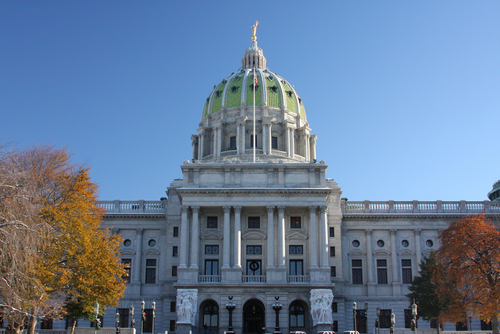
The Pennsylvania House of Representatives on Wednesday passed a $45.5 billion state budget for the fiscal year that began on July 1 after Gov. Josh Shapiro vowed to give a line-item veto to the PASS scholarship program that had led to an impasse in the divided legislature.
The PASS Scholarship Program would provide vouchers for students in underperforming schools to attend school elsewhere. Critics said the $100 million investment in the program would take much-needed funds away from public education, while Republican leaders slammed the Democratic governor for not supporting a proposal he helped create and had included in budget negotiations.
Shapiro said his promise to veto the $100 million PASS scholarship program would move the already overdue budget forward and allow legislators to work together on a compromise for the school voucher program.
State Senate President Pro Tempore Kim Ward (R-39), Senate Majority Leader Joe Pittman (R-41) and Senate Appropriations Committee Chair Scott Martin (R-13) said Shapiro’s promise to veto the PASS program violated their trust.
“The Senate Republican Caucus worked diligently to pass a bipartisan budget,” the legislators said in a statement. “We negotiated in good faith and were eager to stand with Governor Shapiro on one of his priority campaign commitments – supporting school choice opportunities. Today, Governor Shapiro has decided to betray the good faith agreement we reached, leaving tens of thousands of children across Pennsylvania in failing schools.”
House Republican Leader Bryan Cutler (R-Lancaster) said the move allowed Democrats that have a slim majority in the state House, and Shapiro, to avoid a hot-button political issue.
Cutler said the current spending plan did include positive things. “It increases funding for career and technical education, workforce development programs, public safety, and property tax relief while maintaining our commitment to supporting public education, the PA State System of Higher Education, and increasing funding for Educational Improvement and Opportunity Scholarship tax credit programs. It increases support for our Rainy Day Fund, spends less than what the governor originally proposed, and is considerably more reasonable than the unilateral budget passed out of this House about a month ago by the Democrats on a straight party-line vote,” Cutler said.
But Cutler added that the budget does little to address the “structural deficit and runaway and unaccountable welfare programs, which if not addressed, will threaten the long-term ability of our state to genuinely prosper.”
The budget includes $1 billion for investment into the K-12 public education system, as well as $20 million for the Historically Disadvantaged Business Program to help small minority-, women- and veteran-owned businesses; $1 million for the Manufacturing PA Innovation Program, connecting the state’s universities with businesses to foster innovation and job creations; and more than $33 million to expand apprenticeships and vocational and technical education.
The budget also includes more than $9 million to reform the state’s licensing, permitting and certification processes, including $2.9 million to create the Office of Transformation and Opportunity, a one-stop shop for businesses; and $6.4 million to modernize permitting at the Department of Environmental Protection.